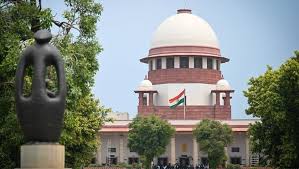



The Supreme Court ruled secretly recorded spousal conversations admissible in matrimonial disputes, prioritizing fair trial rights over privacy. Section 122 allows such evidence in suits between spouses, reflecting marital breakdown. The decision overturned a Punjab and Haryana High Court ruling, ensuring evidence authenticity verification. For UPSC GS II

Copyright infringement not intended
Picture Courtesy: INDIAN EXPRESS
The Supreme Court ruled that secretly recorded conversations between spouses are admissible evidence in matrimonial disputes, including divorce proceedings.
|
What was the situation before this ruling?
|
"Spousal privilege," or marital privilege, is a legal rule that protects private conversations between a husband and a wife during their marriage, and even after it ends, to preserve the trust within a marriage.
Section 122 of the Evidence Act deals with spousal privilege
Prior Precedent => The Court relied on its 1973 R.M. Malkani judgment, which established that if evidence is relevant, independently verifiable, and fits legal exceptions, courts can admit it even if secretly collected. The Court extended this logic to matrimonial cases.
"Eavesdropper" Analogy => The Supreme Court considers a secret recording device no different from an "eavesdropper" or a third-party witness. Since Section 122 of the Evidence Act allows a third party to testify about marital communications in disputes between spouses, the Court saw no reason to exclude digital recordings.
Balancing Rights => The Court acknowledged privacy rights but stress that the right to a fair trial is also a fundamental right. In matrimonial disputes, where evidence might only exist between spouses, these recordings become essential for justice.
|
Bharatiya Sakshya Adhiniyam, 2023 (BSA) => Expand the definition of documents to include digital and electronic evidence, making records from communication devices like phones and laptops directly admissible. |
Erosion of Privacy => Secret recordings breach the "reasonable expectation of privacy," turning a personal relationship into a potential surveillance zone.
Potential for Misuse and Manipulation => Secret recordings can be easily edited, taken out of context, or even fabricated using advanced technology.
Increased Use of Digital Evidence => The judgment validates the use of digital evidence, likely leading to a surge in its collection and presentation in disputes.
Encouraging Spying => The Court dismissed the concern that the ruling promotes spying. It stated that if spouses are already secretly recording each other, the marriage likely already lacks trust and is effectively broken.
Unfair for Women => A major concern is the potential for unfairness to women due to India's digital gender gap in smartphone ownership and internet access, which provide unfair advantage to men in collecting evidence.
|
According to the GSMA's Mobile Gender Gap Report 2025
|
Clear Guidelines => Establish comprehensive judicial guidelines, strict contextual relevance, consideration of coercion/illegality in procurement, and proportionality (weighing evidence value against privacy violation).
Judicial Training => Provide specialized training for judges on digital evidence, forensics, and applying privacy principles in assessing recordings.
Promote Legal Aid => Launch public awareness campaigns on digital evidence rights and provide accessible legal aid to ensure a level playing field.
Dispute Resolution => Encourage and strengthen mediation and counseling for disputes to resolve conflicts.
Digital Gender Divide => Bridge the digital gender gap through equitable access to technology and literacy.
|
FAQ Q. What did the Supreme Court rule on secret spouse recordings? The Supreme Court ruled that secretly recorded conversations between spouses are admissible evidence in matrimonial disputes. Q. What is "Spousal Privilege" in Indian Law? Spousal privilege (Section 122 of the Evidence Act) protects confidential communications between spouses during marriage from being compelled or allowed in court. Q. What are the key concerns stemming from this ruling? Main concerns include privacy erosion, potential for manipulation, and unfairness to women due to India's digital gender gap. |
Must Read Articles:
INTERCEPTION ORDER DELETION POWER EXTENDED
Source: INDIAN EXPRESS
|
PRACTICE QUESTION Q. "The tension between privacy and justice is exacerbated by technological advancements that outpace legal and ethical frameworks." 150 words |




© 2026 iasgyan. All right reserved